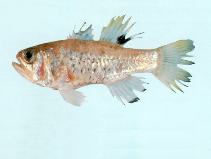Add your observation in Fish WatcherAquaMaps webservice down at the moment
Upload your photos and videos
Pictures | Google imageJaydia carinatus
Picture by CSIRO
Pictures | Google imageJaydia carinatus
Picture by CSIRO
Classification / Names आम नाम | उपशब्द | Catalog of Fishes(वर्ग, प्रजाति) | ITIS | CoL | WoRMS | Cloffa
> Kurtiformes (Nurseryfishes, cardinalfishes.) > Apogonidae (Cardinalfishes) > Apogoninae
More on author: Cuvier.
More on author: Cuvier.
Environment: milieu / climate zone / depth range / distribution range पारिस्थितिकी
समुद्री प्रवाल-भित्ति संयुक्त; गहराई सीमा 50 - 146 m (Ref. 57178). Temperate
वितरण देश | ऐफ ऐ ओ क्षेत्र | Ecosystems | संयोग | Point map | भूमिका | Faunafri
Western Pacific: Japan and the China seas. Reported farther south from northwestern Australia (Ref. 3132).
आकार / वज़न / Age
Short description पहचान कुंजी | आकृति विज्ञान | मौरफोमैटरिक्स
पृष्ठीय रीढ़ (सम्पूर्ण) : 8; पृष्ठीय सौफट रेज़ (सम्पूर्ण) : 9; गुदा कांटा: 2; ऐनल सौफट रेज़: 8. Second dorsal fin with black ovoid ocellus. Scales ctenoid, large and deciduous.
Occurs on muddy bottoms. Adults are sometimes caught by trawl nets, but the young are rather rare (Ref. 559). Mximum depth reported taken from Ref. 57178.
Life cycle and mating behavior परिपक्व अवधि | पुनरुत्पत्ति | मछलीऔ का अंडे देना | अंडे | Fecundity | लार्वा
Main reference
Upload your references | संदर्भ | संयोजक | सहयोगीयो
Paxton, J.R., D.F. Hoese, G.R. Allen and J.E. Hanley, 1989. Pisces. Petromyzontidae to Carangidae. Zoological Catalogue of Australia, Vol. 7. Australian Government Publishing Service, Canberra, 665 p. (Ref. 7300)
CITES
Not Evaluated
Threat to humans
Harmless
Human uses
FAO - Publication: search | FishSource |
अधिक जानकारी
Trophic ecology
खाद्य पदार्थ
संघटक आहार
आहार खपत
Food rations
परभक्षी
खाद्य पदार्थ
संघटक आहार
आहार खपत
Food rations
परभक्षी
Population dynamics
Growth parameters
Max. ages / sizes
Length-weight rel.
Length-length rel.
Length-frequencies
Mass conversion
भर्ती
बहुतायत
Growth parameters
Max. ages / sizes
Length-weight rel.
Length-length rel.
Length-frequencies
Mass conversion
भर्ती
बहुतायत
Life cycle
पुनरुत्पत्ति
परिपक्व अवधि
Maturity/Gills rel.
Fecundity
मछलीऔ का अंडे देना
Spawning aggregations
अंडे
Egg development
लार्वा
लारवल गतिकी
पुनरुत्पत्ति
परिपक्व अवधि
Maturity/Gills rel.
Fecundity
मछलीऔ का अंडे देना
Spawning aggregations
अंडे
Egg development
लार्वा
लारवल गतिकी
Anatomy
गिल क्षेत्र
Brain
Otolith
गिल क्षेत्र
Brain
Otolith
Physiology
Body composition
Nutrients
Oxygen consumption
Swimming type
Swimming speed
Visual pigments
Fish sound
Diseases & Parasites
Toxicity (LC50s)
Body composition
Nutrients
Oxygen consumption
Swimming type
Swimming speed
Visual pigments
Fish sound
Diseases & Parasites
Toxicity (LC50s)
Genetics
आनुवंशिकी
Heterozygosity
हैरेटिबिलटी
आनुवंशिकी
Heterozygosity
हैरेटिबिलटी
Human related
Aquaculture systems
जलीयकृषि रूपरेखाऐ
खींच
Ciguatera cases
Stamps, coins, misc.
Aquaculture systems
जलीयकृषि रूपरेखाऐ
खींच
Ciguatera cases
Stamps, coins, misc.
साधन
E-book | कार्यक्षेत्र पथप्रदर्शक | लंबाई आवृति इंद्रजालिक | जीवन-इतिहास उपकरण | बिन्दु नक्शा | Classification Tree
| Catch-MSY |
Special reports
Download XML
Summary page | Point data | आम नाम | Photos
इंटरनेट स्रोत
AFORO (otoliths) | Aquatic Commons | BHL | Cloffa | BOLDSystems | Websites from users | Check FishWatcher | CISTI | Catalog of Fishes: वर्ग, प्रजाति | DiscoverLife | ECOTOX | FAO - Publication: search | Faunafri | Fishipedia | Fishtrace | GenBank: genome, nucleotide | GloBI | Google Books | Google Scholar | Google | IGFA World Record | MitoFish | राष्ट्रीय आंकड़ासंचय | Otolith Atlas of Taiwan Fishes | PubMed | Reef Life Survey | Socotra Atlas | Tree of Life | Wikipedia: Go, खोज | World Records Freshwater Fishing | Zoological Record
Estimates based on models
Preferred temperature (Ref. 123201): 17.3 - 27.7, mean 25.1 °C (based on 357 cells).
Phylogenetic diversity index (Ref. 82804): PD50 = 0.5000 [Uniqueness, from 0.5 = low to 2.0 = high].
Bayesian length-weight: a=0.01995 (0.00906 - 0.04395), b=3.01 (2.83 - 3.19), in cm total length, based on all LWR estimates for this body shape (Ref. 93245).
Trophic level (Ref. 69278): 3.6 ±0.6 se; based on size and trophs of closest relatives
लौटाव (Ref. 120179): ऊंचा, न्यूनतम जनसंख्या दुगनी समय अवलागत 15 महीने। (Preliminary K or Fecundity.).
Fishing Vulnerability (Ref. 59153): Low vulnerability (10 of 100).
Nutrients (Ref. 124155): Calcium = 30.8 [12.9, 57.5] mg/100g; Iron = 0.275 [0.135, 0.527] mg/100g; Protein = 18.9 [17.7, 20.2] %; Omega3 = 0.377 [0.187, 0.784] g/100g; Selenium = 8.91 [3.64, 21.00] μg/100g; VitaminA = 39.8 [7.9, 185.0] μg/100g; Zinc = 0.637 [0.387, 1.009] mg/100g (wet weight);




